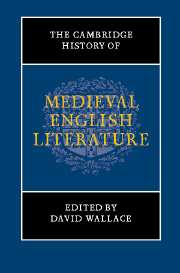Book contents
- Frontmatter
- I AFTER THE NORMAN CONQUEST
- Introduction
- 1 Old English and its afterlife
- 2 Anglo-Norman cultures in England, 1066–1460
- 3 Early Middle English
- 4 National, world and women’s history: writers and readers in post-Conquest England
- 5 Latinitas
- 6 Romance in England, 1066–1400
- II WRITING IN THE BRITISH ISLES
- III INSTITUTIONAL PRODUCTION
- IV AFTER THE BLACK DEATH
- V BEFORE THE REFORMATION
- Chronological outline of historical events and texts in Britain, 1050–1550
- Bibliography
- Index of manuscripts
- Index
- References
2 - Anglo-Norman cultures in England, 1066–1460
from I - AFTER THE NORMAN CONQUEST
Published online by Cambridge University Press: 28 March 2008
- Frontmatter
- I AFTER THE NORMAN CONQUEST
- Introduction
- 1 Old English and its afterlife
- 2 Anglo-Norman cultures in England, 1066–1460
- 3 Early Middle English
- 4 National, world and women’s history: writers and readers in post-Conquest England
- 5 Latinitas
- 6 Romance in England, 1066–1400
- II WRITING IN THE BRITISH ISLES
- III INSTITUTIONAL PRODUCTION
- IV AFTER THE BLACK DEATH
- V BEFORE THE REFORMATION
- Chronological outline of historical events and texts in Britain, 1050–1550
- Bibliography
- Index of manuscripts
- Index
- References
Summary
For more than three centuries of Norman and Plantagenet rule, the British Isles were, with the exception of the Norman kingdom in Sicily, the most significantly multilingual and multicultural territory in western Europe. The interactions of William the Conqueror’s followers and peoples native to Britain were not simply adversarial, nor were the ethnic conceptions and political ambitions of the time equivalent to those inspiring Britain’s modern attempts at empire. The conquerors and their followers were unquestionably bent on dominating the inhabitants of Britain, but this process was not entirely a matter of force, nor should the inhabitants’ responding manoeuvres and successes be elided into a model of helpless subjection. The extent to which intermarriage, bilingualism and cultural adoptions came to characterize Norman rule sharply contrasts with the later British programme of empire-building and testifies both to the Normans’ desire to make Britain their permanent home and to the conquered inhabitants’ success at imposing themselves and their ways on the new arrivals. Chapters below on writing in Wales, Ireland and Scotland leave to this chapter the conquerors’ experience of England.
Conquest and accommodation
To be sure, the process of conquest begins with ethnic as well as military hostilities. Wace’s account of the minstrel Taillefer singing at the Battle of Hastings about Roland at the Battle of Roncevaux, an anecdote also found in William of Malmesbury’s chronicle, may indicate that the Normans considered Charlemagne’s men to be their own heroic predecessors – however recently the Normans had borrowed them from the Franks after moving in about 911 from Scandinavia into northern France. Taillefer’s song anticipates the Anglo-Norman copy of the Song of Roland, Oxford, Bodleian Library, MS Digby 23, made some seventy-five years after the Battle of Hastings.
- Type
- Chapter
- Information
- The Cambridge History of Medieval English Literature , pp. 35 - 60Publisher: Cambridge University PressPrint publication year: 1999
References
- 8
- Cited by



